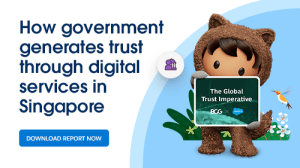How Government Generates Trust Through Digital Services in Singapore



There are links between a government’s digital services and levels of trust for government. Learn more this relationship.

Peter Schwartz
A major global study from Boston Consulting Group (BCG) and Salesforce reveals the links between a government’s digital services and levels of trust for government.
It’s not news to anybody that the pandemic has driven people online in record numbers. More people than ever now live more of their lives within a digital realm.
What is fascinating is the effect this is having on customer expectations, and on trust in government.
Whether it’s shopping, working, learning, healthcare or government services, people are looking to the digital realm, first. As they do, they are having varying levels of experience.
Every time they have a wow moment, every time they’re delighted by a remarkable, personalised online interaction, their expectations are being shaped.
The trailblazing report The Global Trust Imperative from BCG and Salesforce offers a sharp focus on what those changing expectations mean for governments and their agencies. In particular, this report – developed from surveys with 24,500 people across 36 countries – reveals that 87 per cent of respondents globally believe that a great digital government customer experience would increase their degree of trust. This alone highlights the fact that there is a deep and powerful connection between digital government services and trust in that government.
In Singapore the report found 77 per cent of respondents say great digital experiences would have the highest positive impact on trust for the government. Importantly, almost as many say bad experiences decrease trust. There’s great risk involved in getting digital experience wrong, or not providing it at all.
Some of the findings are encouraging in terms of the positive impact digital upgrades have already had. For example, in Singapore, 54 per cent say their needs are being met by their government’s digital services.
There were several findings of interest to public sector leaders. For example, globally, 94 per cent of customers say they’re not happy with just any digital offering. Customers worldwide expect government digital services to be as good as or better than banks, telcos, leading tech firms or other leading governments. That’s high expectations, indeed.
Let’s dig a little deeper.
What customers want
To know how to best serve customers, first we need to understand what they don’t want. Globally, 70 per cent of customers say the last interaction they had with digital government services had at least one pain point. Although this number varied from country to country, even a leading country like Singapore found that 64 per cent of users faced some type of problem when accessing their digital service.
So what is it that they want? Where are governments falling short in the digital realm?
The most common problems were:
- the length or difficulty of the process – 21 per cent
- technical difficulties or issues completing their request – 20 per cent
- no help available – 16 per cent
- not having all the paperwork or information they needed – 16 per cent
Why is all of this important? Because customers are hesitant to share personal data with the government. The report tells us 41 per cent of customers feel they have little control over their data and 37 per cent don’t trust that their data won’t be used for additional purposes without their consent.
But here’s where it gets really interesting. More than half (52 per cent) of customers globally said if they could see how it would benefit themselves, they would be willing to provide personal data to the government.
In other words, the government can build enormous trust by communicating benefits more effectively.
How is this achieved?
In the public sector, spending is at an all-time high. However, budgets are still limited.
Transparency is an important goal – trust will convince customers to share more data. To effectively utilize that data, governments require a modern, agile and resilient technology engine that is fuelled by data.
Government also needs to be where the people are, digitally speaking. That’s not on desktop screens but instead on fully modular devices, the same ones being used by digital natives. If it wants to deliver the right messages and services to the right audiences/users at the right time, the government needs to be on smartphones and tablets.
And speaking of “the right messages” and “the right customers”, data must be utilised to personalise messaging and service. Personalisation further builds trust. It demonstrates interest and thoughtfulness. It streamlines processes. It removes many of the blocks, mentioned above, that make customers feel that the government is falling short in digital delivery.
Finally, the government must seek constant, real-time improvement to its services. For example, great government apps offer a simple choice of thumbs-up or thumbs-down after almost any online interaction. It’s immediate, real-time data that should lead to constant improvement of service.
Breed success by addressing data-sharing fears
The reality is that governments that experience greater trust from their online users deliver better online service. Better service delivery that meets or exceeds user expectations encourages more data to be shared. This drives even better service delivery. It’s a virtuous cycle.
In fact, The Global Trust Imperative tells us that roughly half of all respondents would share their personal information if it would benefit themselves (52 per cent) or the community (47 per cent). To encourage sharing information, governments will first need to address some universal fears. Globally, 1 in 3 users were afraid their personal information would be made public (36 per cent), not stored securely (36 per cent), or could be stolen by hackers (35 per cent).
Therefore, it’s worth putting some effort into the establishment of a data-sharing compact with users. The quality/trust benefits to users and to government agencies should be made clear and tangible.
What are the other high-value focus points to come out of the research?
The first is a recognition of the good work done so far, and the resulting gains in trust over the last few years. During the pandemic, digital projects were delivered at pace and under unprecedented conditions. They were often cross-agency and multi-disciplinary, representing best-practice digital delivery. There’s now a great opportunity to take this experience and trust forward to create ever greater gains.
What does the report make clear? First, digital services that deliver on users’ increasing expectations are critical to a functioning government.
Next, there is a clear connection between a government’s quality of digital services and the overall levels of trust people have in that government.
We know most users are still experiencing problems and challenges with online government services, and are hesitant to share data. We also know that if the personal benefits are clear and tangible, people will be more willing to share their personal data.
Finally, governments able to deliver a high quality of service delivery will achieve enhanced policy outcomes as trust will increase.
Never have technology and human sentiment been so aligned, meaning right now there is great opportunity for governments to innovate in an environment of increasing trust.
Download The Global Trust Imperative report here.




















